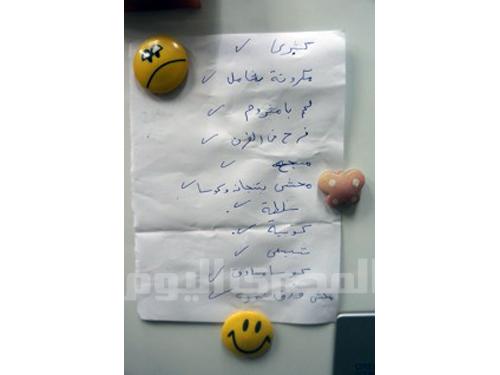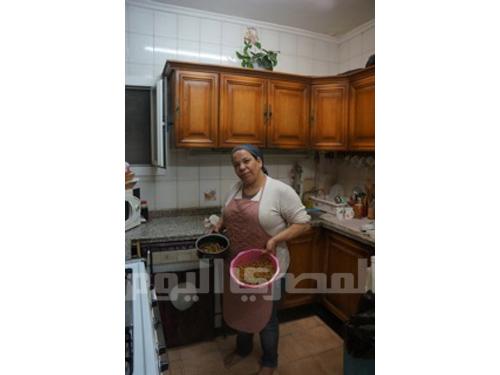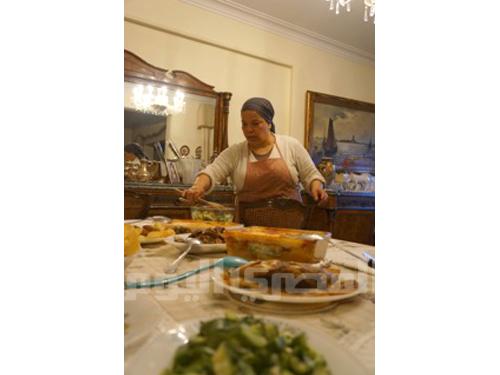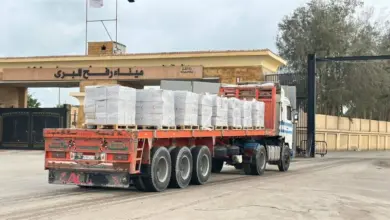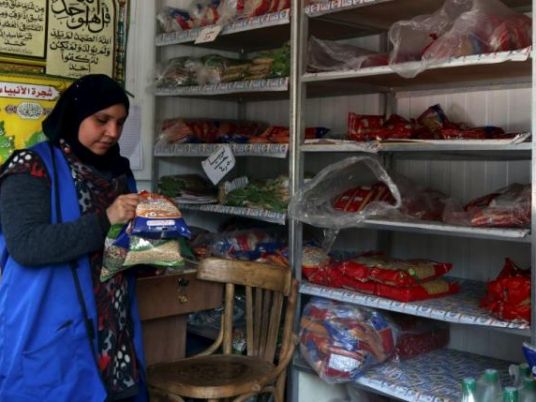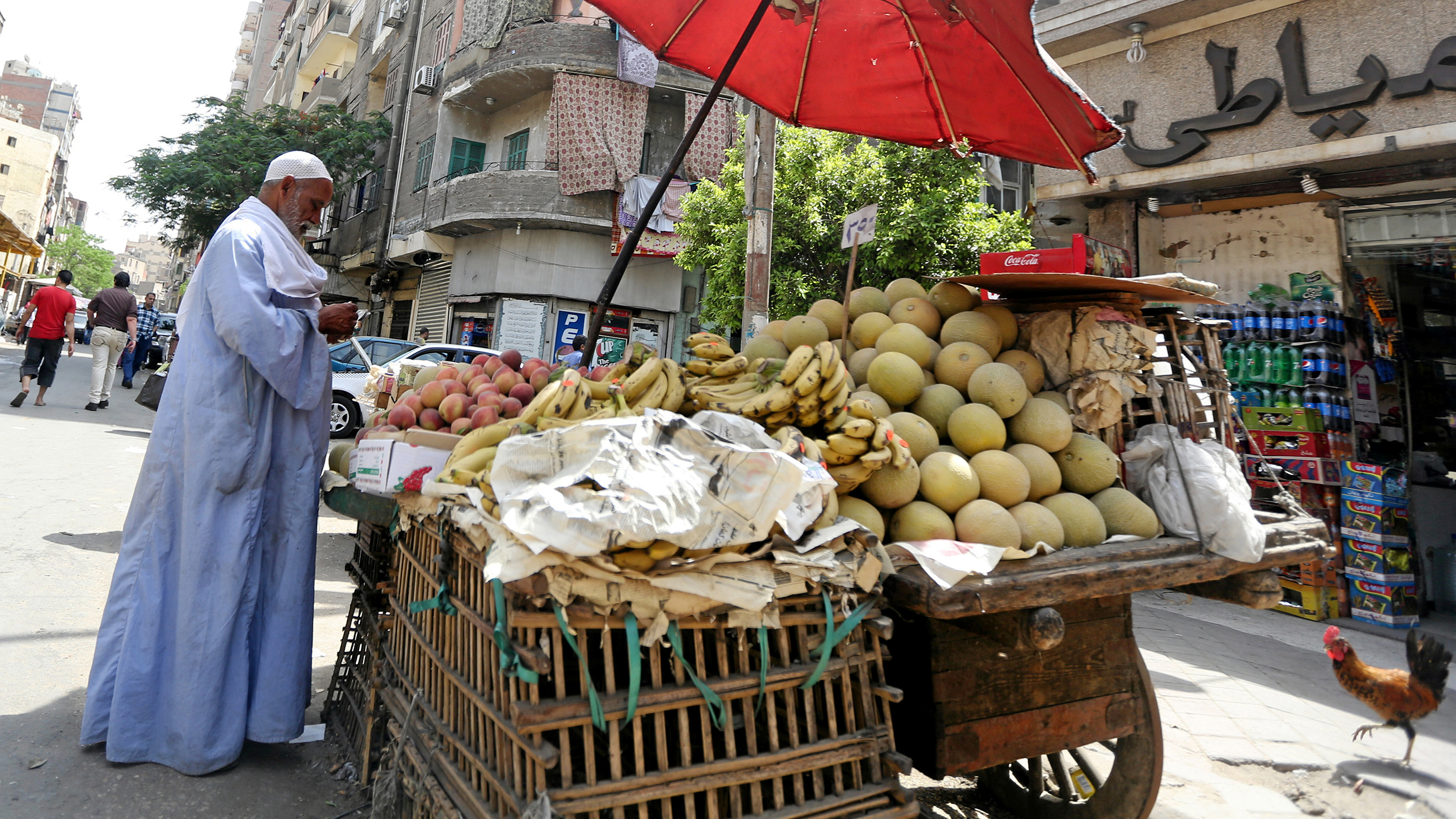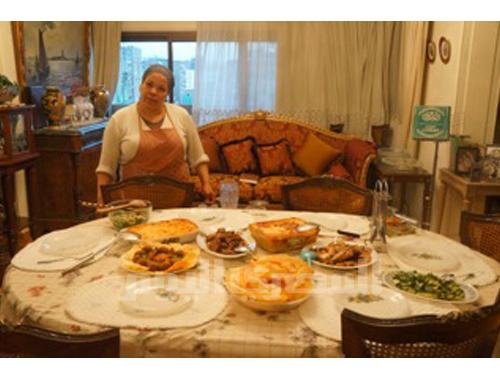
Egypt is a massive living organism — a web of ticking clocks, each set to a slightly different millisecond. With approximately 80 million in the country, 18 million of whom are woven into the streets and buildings of Cairo, the traffic of the city may crawl but many would say it is only by the will of God that it continues to flow at all. People are everywhere — driving, jumping off buses, walking, bicycling… ticking minute by minute through the days and nights of the city. Doctors, valets, belly dancers and beggars… Cairo keeps 18 million cogs in one of the world’s busiest wheels. This series takes a magnifying glass to one person, a representative of a job that keeps the city ticking — an eye-level shot that takes you through a day in the life of a cog in the wheel of Cairo.
Nevine El Shabrawy
Fawzeia, an extraordinary cook in her mid-forties, doesn't care about vacations anymore. All she does is practice her hobby and earn money with it. "I'm a lucky woman because I work and earn money doing what I love doing the most: cooking," says Fawzeia.
"I don't claim to be a prestigious chef but I'm not embarrassed to be working at homes either. As long as I earn money from my own efforts, there's nothing to be ashamed of, right?" says Fawzeia, very convinced of her career choice.
She used to work full-time at a foreigner's house in 6th of October City, sleeping over and working non-stop from 8 am, starting with preparing breakfast, until 7 pm when she finished off the day with the dinner meals and desserts, and of course tidying up the mess in the kitchen.
Those days are over. "If God allows, I'm going to get married in a few months," said Fawzeia with a beaming smile. "I can't sleep over at a stranger's place, even if it's for the sake of working. I want to be working somewhere near home in order not to get late," referring to her responsibilities when married.
Moreover, she complains about having been "isolated" due to her work in 6th of October. "Now I like it better; I work in two homes of very decent families at the moment, one in Dokki and the second in Heliopolis, and I don't have to sleep over, so I'm moving and socializing the whole month, which I honestly like more. I love cooking because it obliges me to talk to people and socialize,” says Fawzeia of her current situation.
A real mover and a serious worker, Fawzeia gets a lot of sleep to prevent collapsing. One has to look closer at the sequence of her day to understand and admire such determination.
8 am
Fawzeia, a Quesna native and Cairo habitant living at her sister's, wakes up, drinks her tea with milk, gets dressed and makes her way to the corner of her street where there is a tuk tuk station.
She rides a tuk tuk to the microbus station, from where she takes another ride to another microbus station, to finally take a microbus from there that brings her to another microbus station, that brings her to the final destination: the house she's going to be working in for the day. Today she's working at the Dokki family's. It takes her four rides in total. Sometimes she will take five if she is going to cook for the family in Heliopolis, she says.
"Before I started to work at both homes, I required that I am given LE10 for transportation in addition to my salary, or else I would be broke," says she with a laugh. I ask her with a giggle why she's laughing, but I didn't get an answer … just yet.
9:30 am
Ringing the bell, Fawzeia awaits at the door, excited about what she's going to cook for the day. "I have a real passion for food and cooking, you know?" she says. "At first, I was a cleaning lady but later I discovered that my passion lays in the kitchen. I would observe anyone cooking and learned almost all the recipes I know that way. Can you believe I've been cooking for only three years?" she says proudly of her accomplishments.
11 am
The door bell rings. "It's always either the fresh vegetables and groceries I order or Fatma," Fawzeia said before opening the door. It was both.
Fatma is the cleaning lady of the family in Dokki and Fawzeia's future sister-in-law, who offered her this opportunity. Both giggle upon seeing each other, and start chatting about family issues and, of course, gossiping about Mohamed, Fatma's brother and Fawzeia's future husband.
After Fatma has left to look after her work, Fawzeia feels more comfortable talking about Mohamed and their "relationship."
"The problem with Mohamed is that he doesn't work at all and depends on the money I give him," said Fawzeia with sad eyes. "He used to do drugs, like most of his peers, and is basically a plumber which is a very independent and unstable job, if you consider it a job at all."
When I asked Fawzeia what she meant with "like most of his peers," she shrugged mumbling, "They all do drugs and depend on their women," giving me the example of Fatma. Fatma had married a jobless man who depended on her money, used drugs, and abused her. When she had a daughter, named Nour, she got a divorce out of fear that he would abuse her as well.
"Fatma is holding a grudge against marriage, traumatized," says a smiling Fawzeia, "but I'm not. I had married once before but my experience wasn't as bad as Fatma's, luckily." Fawzeia, giggly, resumed.
"I honestly can't wait to sign those (marriage) papers."
1 pm
The first meal is almost ready. "For this family — whom I love dearly — I have to decrease the salt. They're real tasters and I love that about them, because I can't continue with my work if the people eating never tell me their honest opinion. They tell me what they like and what they don't and give me comments about what I should change, which helps me improve and make the meals like they wish," said Fawzeia, while chopping some potatoes for her next meal.
Because she comes to Dokki twice a week — sundays and wednesdays — she has to make meals that are enough for the three days till her next visit.
"Like today, I have to cook three main courses, like a pasta dish or stuffed vegetables and then other three side dishes, like steak with brown mushroom sauce or basically a meat dish, which is the ritual of Egyptian homes in general," says Fawzeia.
3 pm
The second meal is on the stove and third meal is on its way.
Fawzeia's sister calls. "No, no, I won't. I won't cook anymore. Do it for yourself," shouts Fawzeia and hangs up. "I live at my sister's and she expects me to get groceries and cook for her everyday but I can't do that, plus I'm upset with her." Fawzeia says her sister does not treat her as well as she used to. "Because I can't give her money anymore."
Checking around to make sure Fatma doesn't hear what she has to say next, Fawzeia whispers, "I don't have that much money. I have a daily salary, not a monthly one like before. Whatever I earn gets spent right away."
Being the eldest of eight siblings, Fawzeia believes she has done her best in paying her siblings' expenses: "I helped them all to get married. But now that I don't pay and contribute to their lives as much, I don't feel very welcome at my sister's."
6 pm
The meals and dishes for the next three days are ready and covered. "I leave them covered outside until they get cool and then the Madam puts them in the refrigerator. But now I have to get dressed," Fawzeia says excitedly.
For the ride back home, Fawzeia has to take the same four rides as in the morning. "Fatma is so lucky. She only has to take two to go to work and back home," giggles Fawzeia, "but I'm not unlucky. I like to move and be around people."
8 pm
Fawzeia is finally home. She takes a shower, eats and drinks her cup of tea while watching TV with her nieces, and goes straight up to her room where she can talk with Mohamed quietly.
"Marriage is a woman's honor, even if the Egyptian man isn't perfect, does drugs and doesn't work. In our society, the women pay but don't lead because that's the 'sunnah' of life," is Fawzeia's response to the question of why she's so determined to get married, although she's officially considered "the man of the house."
She knows she doesn't need it to survive financially, but to survive in a society that needs to "cover" women. According to her, having a man is a great symbol, a charm that protects. "A married woman can say with all her courage 'I have a man who protects me.' When I get married, I can say 'My husband awaits me,' and immediately be respected," she says.
Changing subjects, Fawzeia tells me suddenly: "It's such a shame that Sawiris [the owner of Mobinil] made two hours cost LE2.25."
"Do you get what I mean?" she asks me, laughing.
10 pm
Mohamed and Fawzeia are still talking, though she starts falling asleep while on the phone with him. "'Fawzeia, are you snoring?' he always asks me when I don't respond to what he's saying anymore," she says with a laugh. "What can I do? I just disconnect from the world."
At around 10:30 pm, Fawzeia hangs up and gets some rest before a new day of whirlwind rides and hot kitchens.

